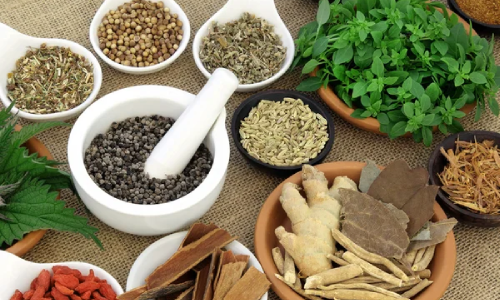Kapha Dosha is responsible for giving structure and lubrication to the body. When balanced, Kapha gives us strength, protects against diseases and keeps us calm. But if it’s out of balance, it can cause weight gain, congestion and tiredness. My treatment for Dosha imbalances majorly involves dietary and lifestyle correction. And if necessary, It includes medicines in the treatment that aligns with the patients’ Prakriti (body type), Dosha imbalances and health conditions. The medicines are made in my unit using Ayurvedic medicinal Plants through traditional methods as mentioned in ancient Ayurvedic texts or Samhitas. The Ayurvedic texts have mentions of an array of medicinal plants that help balance your Doshas. In this blog, let us discuss the top herbs that help balance Kapha Dosha. 5 Potent Medicinal Plants to Balance Kapha Dosha These are some of the top medicinal plants that can help balance your Kapha Dosha: Turmeric Turmeric or Haridra is a bright yellow spice that comes from the dried rhizome of a plant in the ginger family. It’s a superstar in Ayurveda, known for its many healing properties. The herb is particularly effective in balancing Kapha Dosha. Its warming, dry and light qualities counteract Kapha’s heavy and moist nature. Benefits Anti-inflammatory Properties: One of the most amazing things about turmeric is its curcumin content. This compound helps reduce inflammation, which is great for managing Kapha. Digestion: Turmeric supports the digestive fire or Agni, aiding digestion and metabolism. This is especially helpful for people with Kapha body types, who often struggle with slow digestion. Detoxification: Another fantastic benefit of turmeric is its ability to support liver function and eliminate toxins (Ama) from the body. I often feel lighter and more energized when I regularly include turmeric in my diet. How to Use Turmeric is a staple ingredient in almost all Indian dishes. So, I would say it is the best way to incorporate turmeric into your routine. You can add it as an ingredient to curries and soups or use its powder to make tea. Also, you can combine it with warm milk to make turmeric milk, which is great for coughs and colds, getting a good sleep and alleviating period cramps. If you prefer, you can take turmeric supplements, but it’s always a good idea to consult with an Ayurvedic doctor first. Ginger Ginger, known as Shunti in Sanskrit, is a versatile herbal option to balance your Kapha Dosha. It has warming and stimulating properties that help in energizing the body and fighting off problems associated with Kapha, such as feeling “sluggish” or “congested.” Benefits Digestive Health: Works as a good appetizer and helps to improve digestion by enhancing the Agni. This reduces the accumulation of Ama as well as ensures that the food gets digested properly. Respiratory Health: Works as an expectorant and helps remove mucus from the respiratory tract. This not only helps in relieving congestion but also makes breathing easier. Weight Control: The herbs are able to enhance metabolism and help in weight reduction. It can prove to be especially effective if there is a Kapha vitiation in the individual’s body. How to Use Ginger can be used as an ingredient in cooking. You can also add it to teas, juices, smoothies, or can even be used as a spice in cooking. Ginger supplements are another option. But it is safe to consult an Ayurvedic doctor before trying them out. Trikatu Trikatu is a blend of three powerful spices: black pepper, long pepper (Pippali) and dry ginger. The strong heating and stimulating properties of this combination is great for balancing Kapha Dosha. Benefits Metabolic Booster: Trikatu helps enhance your metabolism and boosts your Agni, which helps your body process food more efficiently. Detoxification: It helps your body get rid of Ama, reducing the risk of Kapha-related issues. Respiratory Health: Trikatu is also good for clearing respiratory congestion and improving lung function. How to Use You can take Trikatu powder with honey or warm water. It’s also available in tablet form. As always, it’s best to consult with an Ayurvedic doctor before starting any new supplement. Tulsi Tulsi or Holy Basil is an important herb used in Ayurveda due to its numerous health benefits. It has the added advantage of helping to decrease Kapha Dosha due to its light, dry, and warm nature. Benefits Respiratory Support: Tulsi has a good effect on the respiratory passage and thins the mucus therefore; it is of great value in the case of Kapha respiratory disorders. Stress Relief: It is an adaptogenic agent since it can help the body deal with stress to the point of sharpening your mind. Immune Support: Tulsi also helps to strengthen the body’s defense and increases the body’s capability to fight diseases and infections. How to Use Tulsi can be consumed raw or the leaves may be boiled to prepare a tea or it can be used as a seasoning while preparing a particular dish. Tulsi capsules/tinctures are also available for those who do not want to consume leaves or Tulsi powder. Also Read: Health Benefits of Tulsi Cinnamon Cinnamon or Twak in Sanskrit is a warm spice that helps in moderating Kapha Dosha. Due to its Pungent and hot like qualities, it can be used to balance excess Kapha Dosha. Benefits Blood Sugar Regulation: Cinnamon has a healing effect on blood sugar. Since blood sugar level is a major determinant of metabolism and weight, cinnamon is of great help. Improved Circulation: It stimulates blood flow which combats Kapha’s tendency to cause lethargy. Digestive Aid: Cinnamon helps in digestion and aids in getting rid of digestive problems like bloating and indigestion. How to Use Cinnamon is best added to teas,… Continue reading Medicinal Plants in Ayurveda for Balancing Kapha Dosha
Medicinal Plants in Ayurveda for Balancing Kapha Dosha
